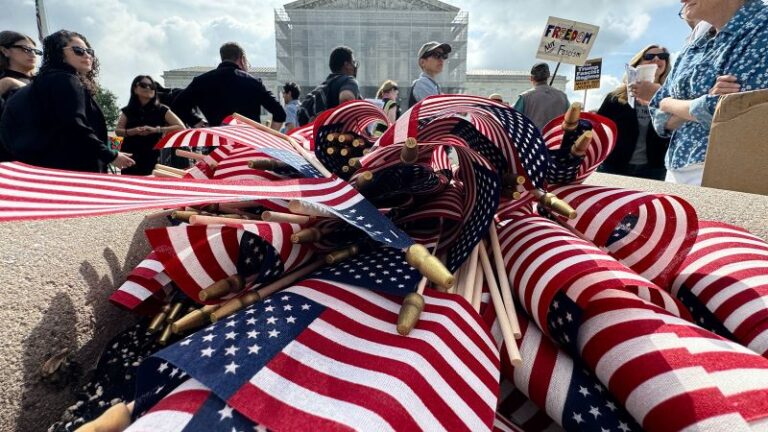A Supreme Court decision last month limiting the use of nationwide injunctions appeared to pave the way for President Donald Trump to begin enforcing his plan to end birthright citizenship on Sunday — until lower courts stalled the effort.
The president could have begun enforcement if lower courts had significantly modified a series of injunctions ahead of a 30-day deadline given by the justices. But that hasn’t happened. In fact, lower court judges have gone in a different direction, preventing Trump’s executive order ending birthright citizenship from taking effect now — and possibly ever — through three new adverse rulings. And more lower court decisions against the administration may be coming.
A federal judge in New Hampshire earlier this month blocked Trump’s order nationwide via a class action lawsuit brought by the American Civil Liberties Union. Such lawsuits are one of the ways the Supreme Court suggested challengers could try to jam up enforcement of the policy for those who would be impacted by it.
The Justice Department has not appealed that ruling from US District Judge Joseph LaPlante, who was appointed to the bench by former President George W. Bush.
The administration was further stymied last week, after a federal appeals court decided that a nationwide injunction issued by a judge in Seattle earlier this year against Trump’s order did not represent a judicial overreach that needed to be curbed in light of the Supreme Court’s ruling.
The Supreme Court ordered lower courts that issued or kept intact such broad injunctions to reconsider those rulings to see whether they comply with the justices’ decision that such injunctions may not be needed to provide litigants with the “complete relief” they’re seeking.
“We conclude that the district court did not abuse its discretion in issuing a universal injunction in order to give the states complete relief,” the 9th US Circuit Court of Appeals said in a 2-1 decision in a case brought by several Democratic-led states against Trump’s order.
The administration has not yet appealed that ruling. The 9th Circuit’s decision may soon bring the birthright issue back before the Supreme Court, since the appeals court had also reviewed the merits of the executive order and found that it was unconstitutional. The Supreme Court’s June 27 decision did not address the legality of the policy, only the use of nationwide injunctions.
Yet another blow came on Friday, when US District Judge Leo Sorokin decided that his earlier nationwide injunction against the birthright policy could not be narrowed in a way that would “feasibly and adequately protect” against the harms that more than a dozen Democratic state attorneys general, the District of Columbia and several cities said would befall them if the policy could be enforced, even partially.
In that ruling, Sorokin, an appointee of former President Barack Obama who sits on the federal bench in Boston, repeated his conclusion that Trump’s order “is unconstitutional and contrary to a federal statute.”

It’s not clear whether, absent those three rulings this month, the policy could have taken effect this weekend. In court, attorneys for the administration have avoided providing specifics when speaking about what would happen once the 30-day pause from the Supreme Court is lifted.
“It’s an unusual situation, what the Supreme Court did,” DOJ attorney Eric Hamilton said earlier this month to Sorokin.
It’s possible Trump may never be able to fully implement his order. Every lower court in the US to scrutinize the policy has found it unconstitutional.
Signed by Trump on January 20, the executive order, titled “PROTECTING THE MEANING AND VALUE OF AMERICAN CITIZENSHIP,” said that the federal government will not “issue documents recognizing United States citizenship” to any children born on American soil to parents who were in the country unlawfully, or were in the states lawfully, but temporarily.
But courts have roundly concluded that Trump’s policy violates the Constitution’s 14th Amendment, an 1898 Supreme Court case known as United States v. Wong Kim Ark and years of practice by previous presidents.
Whether the administration decides to file appeals in the cases challenging the executive order is no small matter: Legal experts have long said the government’s decision to take the issue to the Supreme Court only on the technical question of whether courts went too far in blocking his policy nationwide represented a vehicle to undermine the power of lower courts sifting through a bevy of litigation over Trump’s actions.
“The Trump administration was very purposeful and strategic in their decision to go to the Supreme Court on the question of what remedy can people get when they challenge executive actions, as opposed to the merits of this particular executive order,” said Jessica Levinson, a constitutional law professor at Loyola Law School.
More adverse rulings for Trump’s birthright order could be on the horizon.
A federal judge in Maryland, Deborah Boardman, who blocked Trump’s order nationwide said earlier this month that she was prepared to do so again after the plaintiffs in that challenge refiled their case as a class-action lawsuit.
But first, a Richmond, Virginia-based appeals court would have to put the litigation back in her hands.
Meanwhile, the Supreme Court allowed the administration to craft guidance on how the federal government would carry out Trump’s birthright policy, but no details have emerged on what that guidance looks like.
“The agencies are right now working on public guidance to explain how the President’s executive order is going to be implemented,” Hamilton told Sorokin last month, in response to the judge’s question about what’s been done behind the scenes.


